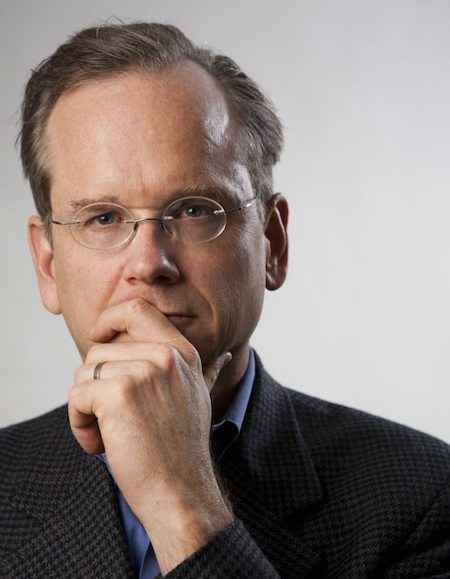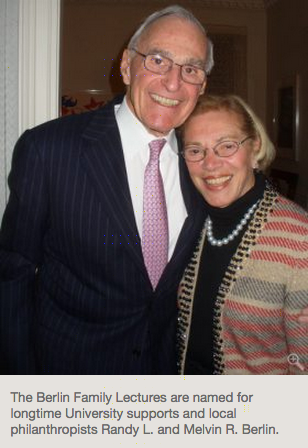Berlin Family Lectures: Lawrence Lessig on Institutional Corruption

This article originally appeared in UChicago News on 1 October.
For many, the term “institutional corruption” evokes memories of American scandals ranging from Watergate to the downfall of Bernie Madoff.
But Harvard professor Lawrence Lessig expects to complicate that perception when delivering the 2014-2015 Randy L. and Melvin R. Berlin Family Lectures, a five-week series that begins Oct. 16 in Mandel Hall.
In the last several years, Lessig and colleagues at Harvard have studied more nuanced forms of corruption in institutions ranging from Congress to the financial services industry.
Lessig hopes his lectures will help people expand their notions of institutional corruption beyond “the traditional conception of corruption as the acts engaged in by evil people.”
“In lots of critical, important institutions, the kind of corruption we're talking about is actually much more significant than the corruption of criminals,” he added. “If we don't have a clear sense of how to think about or talk about this other kind of corruption, we're not going to be able to motivate remedies around it.”
In his five lectures, Lessig will examine institutional corruption in four different contexts: Congress, finance, media and the academy. He will conclude with a discussion of interventions that could correct the problem of institutional corruption.
“GREAT ASPIRATIONS” FOR NEW ANNUAL SERIES
Lessig’s lectures inaugurate the Berlin Family Lectures, an annual series that will bring leading scholars, writers and creative artists from around the world to the University of Chicago campus. The series is presented by the Division of the Humanities and curated by David Nirenberg, the Roman Family Director of the Neubauer Collegium for Culture and Society.

Each visitor will give an extended series of lectures with the aim of interacting with the university community, and developing a book for publication with the University of Chicago Press.
The event is named for the Berlins, local philanthropists and longtime University supporters, in honor of their $3 million gift to UChicago. Randy Berlin, AM’77, is a lecturer at the University of Chicago Law School and a member and past chairperson of the Division of the Humanities’ Visiting Committee. Melvin Berlin is chairman emeritus and founder of Berlin Packaging, LLC.
A 2008 gift from the Berlins allowed the Department of English to establish a professorship focused on the study of the novel, currently held by Maud Ellmann. The Berlins also provided support for the recent “Forms of Fiction: The Novel in English” conference at the University, which featured lectures by A.S. Byatt and Tom McCarthy.
Lessig said he was “honored and a little terrified” to inaugurate the Berlin Family Lectures. “I know there are great aspirations for [the series] going forward,” he said. “I’m working as hard as I can to meet those expectations.”
RETURN TO CAMPUS FOR DISTINGUISHED SCHOLAR
Lessig, who taught at the Law School from 1991 to 1997, is looking forward to his return to the University of Chicago community.
“It’s an amazing Law School, it’s an amazing university and I’m very eager to have a chance to spend some time there again,” he said. “I’m already conspiring about how to get back to the Law School Roundtable.”
Lessig is currently the Roy L. Furman Professor of Law and Leadership at Harvard Law School, director of the Edmond J. Safra Center for Ethics at Harvard University and founder of Rootstrikers, a network of activists leading the fight against government corruption. He has authored numerous books, including Republic, Lost: How Money Corrupts Congress, Code and Other Laws of Cyberspace, Free Culture and Remix.
He serves on the boards of Creative Commons, AXA Research Fund and iCommons.org, as well as on the advisory boards of the Sunlight Foundation, the Better Future Project and Democracy Café. He is a member of the American Academy of Arts and Sciences and the American Philosophical Association, the recipient of numerous awards including the Free Software Foundation’s Freedom Award and Fastcase 50 Award, and one of Scientific American's Top 50 Visionaries.
Lessig holds a BA in economics and a BS in management from the University of Pennsylvania, an MA in philosophy from Cambridge and a JD from Yale. Prior to rejoining the Harvard faculty, Lessig was a professor at Stanford Law School, where he founded the school’s Center for Internet and Society. He clerked for Judge Richard Posner on the 7th Circuit Court of Appeals and Justice Antonin Scalia on the United States Supreme Court.
Acclaimed writers Amitav Ghosh and Mario Vargas Llosa, the winner of the 2010 Nobel Prize in Literature, will deliver the Berlin Family Lectures in academic years 2015-2016 and 2016-2017, respectively.
Lawrence Lessig’s Berlin Family Lectures begin Oct. 16 in Mandel Hall. Martha Roth, dean of the Division of the Humanities and the Chauncey S. Boucher Distinguished Service Professor of Assyriology, and David Nirenberg, dean of the Social Sciences Division and Deborah R. and Edgar D. Jannotta Professor in the Committee on Social Thought, Department of History, Department of Romance Languages and Literatures, and the College, will deliver introductory remarks at the event.
The series continues Oct. 23, Oct. 30, Nov. 6 and Nov. 13 in Room 122 of the Joseph Regenstein Library. For more information, or to RSVP, please visit berlinfamilylectures.uchicago.edu.